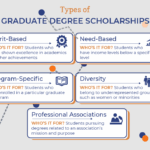I remember staring at the university prospectus, my heart a mix of excitement and dread. On one page, beautiful photos of bustling campus life and cutting-edge labs. On the next, the tuition fees – a number so big it felt like a cruel joke. I wanted to pursue a Master’s degree, to dive deeper into a subject I truly loved, but the financial barrier felt insurmountable. My dream of postgraduate study, it seemed, was just that: a dream.
But then, a little whisper started in my mind: "What about scholarships?"
At first, I brushed it off. Scholarships, I thought, were for geniuses, for people with perfect grades, or for those who were incredibly lucky. I certainly didn’t feel like a genius, and my grades were good, but not "perfect." I was just an ordinary person with a big academic ambition.
If you’re reading this, chances are you’re in a similar boat. You have a dream of furthering your education, perhaps a Master’s or even a PhD, but the cost feels like a brick wall. Well, let me tell you, that brick wall has secret passages, and those passages are called scholarships. And guess what? You don’t have to be a genius or incredibly lucky to find them. You just need to know where to look, how to present yourself, and most importantly, how to keep trying.
This isn’t just an article; it’s my personal story, a journey from feeling hopeless about funding my studies to actually doing it, all thanks to a scholarship. And I’m here to tell you that you can do it too.
The Dream Takes Shape: Why Postgraduate Study?
For me, the decision to pursue a postgraduate degree wasn’t just about getting a better job (though that’s a nice bonus!). It was about a hunger for knowledge. I wanted to explore complex ideas, contribute to new research, and really specialize in my field. I envisioned myself in vibrant academic discussions, surrounded by passionate people, pushing the boundaries of what we know.
However, as soon as that beautiful vision formed, the stark reality of university costs crashed in. Living expenses, tuition, books, health insurance… it added up to an astronomical sum. My family couldn’t afford it, and I didn’t want to start my career buried under a mountain of student loans. It felt like I was stuck between a rock and a hard place.
Discovering the "Hidden Treasures": What Are Scholarships, Really?
My initial understanding of scholarships was pretty limited. I thought they were just for undergraduate students, or perhaps for athletes. But as I started digging, I quickly learned how wrong I was.
Postgraduate scholarships are like hidden treasures, waiting to be found. They come in many forms and are offered by a wide range of organizations:
- Universities Themselves: Many universities offer their own scholarships to attract bright students. These can be based on academic merit, specific research interests, or even your country of origin.
- Government Bodies: Some governments offer scholarships to their citizens for study abroad, or to international students coming to their country. These are often very competitive but can be incredibly generous.
- Private Foundations and Charities: There are countless foundations dedicated to supporting education in specific fields (e.g., science, arts, engineering), for particular demographics, or for students from certain regions.
- Companies and Industries: Businesses sometimes offer scholarships to students pursuing degrees relevant to their industry, hoping to recruit talented graduates later.
- Research Grants/Assistantships: Especially for PhDs, you might find opportunities where your tuition is covered, and you receive a stipend, in exchange for working as a research assistant or teaching assistant.
The key takeaway? Scholarships aren’t just "free money." They are investments. Organizations invest in you because they believe in your potential, your research, or your ability to contribute to their field or society.
My Scholarship Hunt: Becoming a Detective
Once I realized the sheer variety of scholarships out there, my mindset shifted. Instead of feeling overwhelmed, I felt a surge of hope. But hope alone wouldn’t get me a scholarship. I needed a plan.
My scholarship hunt began by becoming a detective. Here’s how I approached it:
-
University Websites Were My First Stop: If I was interested in a specific program or university, their "Admissions" or "Funding" sections became my go-to. I meticulously checked for any scholarships they offered directly. Sometimes these were automatically considered when you applied for admission, but often, they required a separate application.
-
Scholarship Databases Became My Best Friends: Websites like ScholarshipPortal, Fastweb, or even country-specific government scholarship sites (like DAAD for Germany, Chevening for the UK, Fulbright for the US) became my daily browsing ritual. I used keywords related to my field of study, my nationality, and my desired degree level.
-
Connecting with Professors: This was a game-changer, especially for research-focused degrees. I started reaching out to professors whose research aligned with my interests. Sometimes, they had grants that could fund a student, or they knew about specific departmental scholarships. A polite, well-researched email can open many doors.
-
Alumni Networks and Professional Associations: I also looked into organizations related to my undergraduate university’s alumni network, and professional associations in my field. Many of them have their own scholarship programs.
This research phase took time. Lots of it. I kept a detailed spreadsheet of scholarships: the name, the deadline, the eligibility criteria, and the required documents. It helped me stay organized and not miss any opportunities.
Crafting My Story: The Application Process
Finding scholarships was one thing; getting them was another. This is where the real work began. Every application was a chance to tell my story and convince the scholarship committee that I was the right person to invest in.
Here’s what I focused on:
-
The Statement of Purpose (SOP) / Personal Essay: This was arguably the most important part. It wasn’t just about listing my achievements; it was about weaving a narrative. Why this program? Why this university? What were my academic goals? How would this scholarship help me achieve them? And most importantly, what was my unique perspective or contribution? I spent weeks drafting and refining this, getting feedback from mentors and friends. I made sure my passion shone through, not just my grades.
-
Recommendation Letters: I chose my recommenders carefully – professors who knew me well, had seen my academic work, and could speak to my potential. I made it easy for them by providing my CV, my SOP draft, and clear instructions about the scholarship. I gave them plenty of time, too.
-
Academic Transcripts and CV: Of course, good grades matter. But my CV wasn’t just a list of courses. I highlighted relevant projects, research experience, volunteer work, and any leadership roles. Even part-time jobs could show skills like time management or teamwork.
-
Interviews (If Applicable): Some scholarships required an interview. This was my chance to be authentic, articulate my goals clearly, and show my enthusiasm. I practiced answering common questions and thought about what made me stand out.
I learned that tailoring each application was crucial. Copy-pasting the same essay to every scholarship was a recipe for rejection. Each scholarship has different values and priorities, and my application needed to reflect that.
The Rollercoaster of Emotions: Rejections and Perseverance
Let me be honest: I faced rejection. Plenty of it. There were countless "We regret to inform you…" emails. Each one stung a little. It was easy to get discouraged, to feel like I wasn’t good enough, or that my dream was indeed impossible.
But I had a choice: give up, or keep going. I chose to keep going. I saw each rejection not as a definitive "no," but as a redirect. It meant that particular scholarship wasn’t the right fit for me, or perhaps my application wasn’t strong enough for that specific opportunity. I learned from each one, trying to understand if there was anything I could improve for the next application.
My perseverance was fueled by the vision of my postgraduate dream. I kept reminding myself why I wanted to do this.
The Breakthrough Moment: That Email
Then, one ordinary Tuesday afternoon, my inbox pinged. It was an email with a subject line that made my heart leap: "Scholarship Award Notification."
I opened it with trembling hands. And there it was, in black and white: I had been awarded a full scholarship for my Master’s degree. Tuition, living expenses, even a stipend for research materials – all covered.
The relief, the joy, the sheer disbelief – it was overwhelming. It felt like a giant weight had been lifted from my shoulders. My dream, which had once seemed so distant and impossible, was suddenly within reach. I wasn’t just accepted into a program; I was fully funded.
That scholarship didn’t just pay for my education; it gave me freedom. Freedom to focus on my studies without the constant worry of money. Freedom to explore new ideas, take risks in my research, and truly immerse myself in the academic world. It opened doors I never thought possible.
Your Turn: Practical Advice from Someone Who’s Been There
My journey might be unique to me, but the principles are universal. If you’re dreaming of postgraduate study but worried about the cost, here’s my advice:
- Start Early, Seriously Early: Scholarship deadlines are often months, sometimes a year, before the program starts. Give yourself ample time for research, writing, and gathering documents.
- Be a Research Whiz: Don’t just rely on a quick Google search. Dig deep. Check university websites, national government portals, specific academic association sites, and even local community foundations.
- Tailor Every Application: This is crucial. Every scholarship committee wants to see that you’ve put thought into their specific opportunity. Show them why you’re a perfect fit for their values and goals.
- Craft a Compelling Story: Your academic record is important, but your personal essay or statement of purpose is where you truly shine. What motivates you? What challenges have you overcome? How will this degree and scholarship help you make a difference?
- Get Strong Recommendation Letters: Choose people who know you well and can speak genuinely about your abilities and character. Give them all the information they need and plenty of time.
- Proofread Everything (Twice!): A single typo can make your application look careless. Read it yourself, then ask a trusted friend or mentor to review it.
- Don’t Be Afraid to Ask for Help: Reach out to your university’s career services, writing center, or even professors. They often have resources or advice that can be incredibly valuable.
- Prepare for Rejection: It’s part of the process. Don’t let it define you. Learn from it, adjust, and keep applying. Your "no" to one scholarship might be a "yes" to another.
- Network: Connect with current postgraduate students or alumni in your field. They might know about hidden funding opportunities or have tips for navigating the application process.
Your Dream Awaits
The journey to finding a postgraduate scholarship might feel like a marathon, full of twists and turns. But trust me, it’s a marathon worth running. The sense of accomplishment, the relief of financial burden, and the opportunity to truly pursue your academic passion are incredibly rewarding.
Your dream degree isn’t just a dream; it’s a possibility. With perseverance, careful planning, and a belief in yourself, you too can find the funding to make it a reality. Start your research today, tell your story with conviction, and don’t give up. The world needs your unique contributions, and there are organizations out there ready to invest in you. Good luck – your future awaits!



